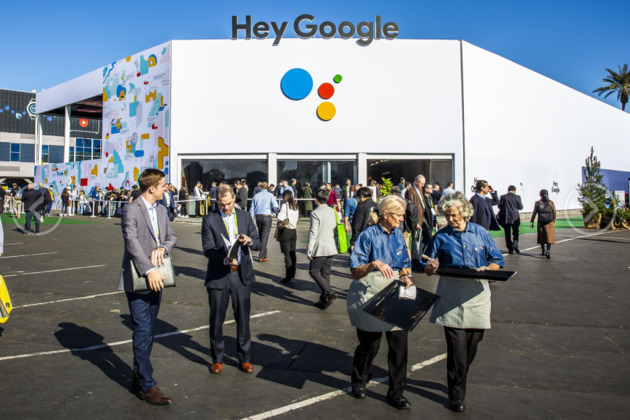
Photo/VCG
Jan.22 (NBD) -- The competition among smart voice assistants is heating up with slogans of "Hey Google" frequently seen on and beyond the Consumer Electronics Show (CES) in Las Vegas and the meeting catalogue questioned how long Amazon can hold its leading position in this sector on the first day of the show.
According to statistics released by data firm Strategy Analytics, Amazon Alexa-enabled devices acquired a 61-percent share of the smart speaker market in the U.S., followed by Google Assistant with 34 percent.
Since they took the majority of market share, any player that eyes the European and American market shouldn't ignore the above mentioned AI-powered virtual assistants. Currently, other electronic device providers are rushing to work with them.
Even electronics giant Samsung is not an exception. So far, Samsung has deployed its self-developed smart assistant Bixby on its smart TVs, fridges, vacuum cleaners and washing machines. In the meantime, it also teamed up with Google Assistant and Alexa to offer more functions of smart home devices.
Chinese TV maker Hisense applied both Google Assistant and Alexa in its TVs in America. Consumers are free to choose what they prefer, said Zhu Dan, person-in-charge of Hisense in the American market.
Analysts believed that Amazon's smart speaker Echo has given Alexa a head start. As early as last September, Alexa Smart Home Vice President Daniel Rausch said during the International Funkausstellung Berlin that Alexa has been deployed in over 20,000 deceives and 50,000 applications.
Google Assistant also developed quickly. In the first three quarters of 2018, sales of Google Home ballooned more than 165 percent over the same period of last year. It also can be noted in large chain-store Costco that Google Assistant-powered Home Hub is available on the market, according to news out Yicai.
For the vast Chinese market, local smart speakers are also indispensable.
Tmall Genie, a smart voice assistant backed by Alibaba, has established ties with BMW and Volvo. A Volvo car at the exhibition stand is able to check whether and road conditions through voice, reported Yicai. In addition, Tmall Genie revealed 50 renowned partners, including Bosch, Dyson, Siemens, Bluetooth, and Panasonic.
Baidu Duer OS assistant first made its debut on CES in 2017. Since then, over 200 million devices have been equipped with it. It now has monthly active equipment of over 35 million pieces. According to statistics of Strategy Analytics, Baidu took the fourth place globally in terms of the shipment of smart speakers in the third quarter of 2018.
Although smart speaker providers worldwide are cooperating with Alexa and Google Assistance, it is important to be not over-reliant on them.
"No matter what kind of smart assistant we use, we have to be at the controlling seat," said CEO of TCL Electronics Wang Cheng to Yicai.
Zhao Feng, CTO of Haier Home Industry Group, said that although the company has worked with many Internet giants, Haier had accumulated large user statistics in the smart home appliance sector and its self-developed U+ system has its own advantage.
Samsung also stressed that it has worked with Amazon and Google in overseas market, but in the Chinese market, Samsung smart home devices mainly apply the Chinese version of its Bixby.
Email: tanyuhan@nbd.com.cn


 川公网安备 51019002001991号
川公网安备 51019002001991号





